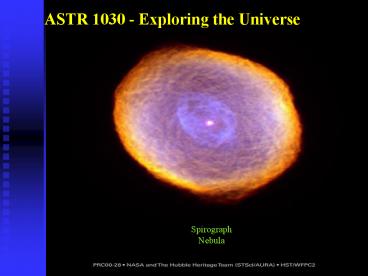... applications to timekeeping; calendars; daily, seasonal
1 / 54
Title:
... applications to timekeeping; calendars; daily, seasonal
Description:
... applications to timekeeping; calendars; daily, seasonal, and long-term changes ... Learn your horoscope? Learn about space aliens? Learn how to tell fortunes? ... –
Number of Views:442
Avg rating:3.0/5.0
Title: ... applications to timekeeping; calendars; daily, seasonal
1
ASTR 1030 - Exploring the Universe
SpirographNebula
2
This course will count for general studies
science credit, but both the lecture and lab must
be completed. You do not have to complete the
lecture and lab in the same semester.
ASTR 1030 - Exploring the Universe (lecture) ASTR
1031 - Observing the Universe (lab)
3
- WHY STUDY ASTRONOMY John R. Percy, University of
Toronto Mississauga, Ontario - Astronomy is deeply-rooted in almost every
culture, as a result of its practical
applications. - Astronomy has obvious practical applications to
timekeeping calendars daily, seasonal, and
long-term changes in weather navigation the
effect of solar radiation, tides, and impacts of
asteroids and comets with the earth. - Astronomy promotes environmental awareness,
through images taken of our fragile planet from
space.
4
- Astronomy has advanced the physical sciences by
providing the ultimate physical laboratory - the
universe - in which scientists encounter
environments far more extreme than anything on
earth. It has advanced the geological sciences by
providing examples of planets and moons in a
variety of environments, with a variety of
properties. - Astronomical calculations have spurred the
development of branches of mathematics such as
trigonometry, logarithms, and calculus now they
drive the development of computers astronomers
use a large fraction of all the supercomputer
time in the world.
5
- Astronomy has led to other technological
advances, such as low-noise radio receivers,
detectors ranging from photographic emulsions to
electronic cameras, and image-processing
techniques now used routinely in medicine, remote
sensing etc. - Astronomy reveals a universe which is vast,
varied, and beautiful - the beauty of the night
sky, the spectacle of an eclipse, the excitement
of a black hole. Astronomy thus illustrates the
fact that science has cultural as well as
economic value. It has inspired artists and poets
through the ages. - Astronomy harnesses curiosity, imagination, and a
sense of shared exploration and discovery.
6
- Astronomy provides an example of an alternative
approach to "the scientific method" -
observation, simulation, and theory, in contrast
to experiment and theory. - Astronomy can promote rational thinking, and an
understanding of the nature of science, through
examples drawn from the history of science, and
from present issues such as pseudo-science. - Astronomy is an enjoyable, inexpensive hobby for
millions of people.
7
ASTR 1030 Exploring the Universe
The Earth is the cradle of mankind, but one
cannot stay in the cradle forever!
Tsiolkovsky
8
We shall not cease from exploration, and the end
of all our exploring will be to arrive where we
started and know the place for the first
time. T. S. Elliot
9
2007
10
Moon Phases
11
Eclipse Predictions by Fred Espenak,
NASA's GSFC
12
Moon Magnificent Desolation
13
Comet Kohoutek
14
Aurora!
15
Jupiter Aurora
16
Jupiters Beautiful Auroral Lights
17
Jupiters Great Red Spot
18
Europa Water? Life?
19
Saturn
20
Titans Surface
21
Martian Surface
22
Extrasolar Planets
23
Constellations
24
Orion Star field
25
Globular Star Cluster
26
Star Cloud
27
(No Transcript)
28
Eagle NebulaStarbirth
29
Starbirth
30
New Stars Being Born
31
The Pleiades
32
Clouds in the Pleiades
33
Planetary Nebula
34
Planetary Nebula
35
Planetary Nebula
36
Supernova
37
Inside an ancient Supernova!
38
Black Holes ?
39
Andromeda Galaxy
40
Sombrero Galaxy
41
Galactic Jets!
42
Spiral Galaxies
43
Galaxies
44
Antenna Galaxy
45
CollidingGalaxies!
46
Hubble Deep Field these galaxies are 10 billion
or more light -years away!
47
Hubble Space Telescope
48
AllSkyMap
49
SpaceAliens ?
50
Purpose for this course
- Learn your horoscope?
- Learn about space aliens?
- Learn how to tell fortunes?
- Predict human traits or human behavior?
- Turn you into mad scientists?
- NO!
Purpose Understand our physical universe by
using science. Science imagination, logic,
critical thinking, creativity Science utilizes
observations, hypothesizing, testing
51
Astronomy vs. Astrology
Astronomy the branch of science that treats the
physics and characteristics of that part of the
universe that lies beyond the Earths atmosphere
Astrology a non-scientific system based on
superstition, that claims to explain or predict
human actions or behaviors by the study of the
celestial positions
52
MATH
Its the language of science
53
How to do well
- Attend class
- Take notes
- Review notes and PowerPoints
- Study notes for exams (I give hard tests!)
- Ask questions Come see me!
- (Consider how do you do well in other things)
54
Success
80 of success is just showing up! Woody
Allen Lets get started!































